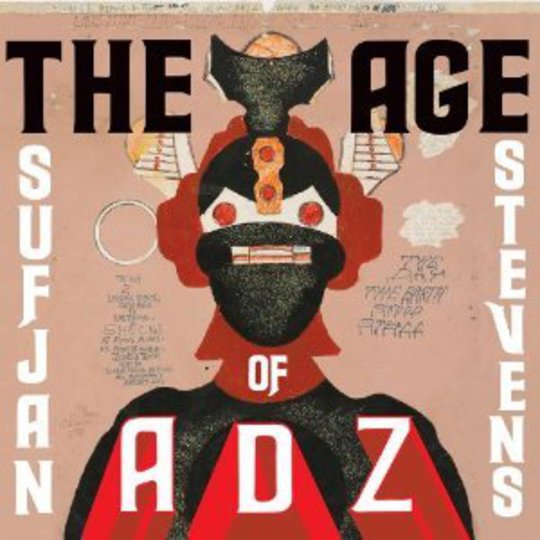On ‘Futile Devices’, the twinkling two minutes and eleven seconds that ushers in The Age of Adz, Sufjan Stevens sings of wandering through his lover’s apartment, of safety and security; sleeping on sofas and guitars and blankets and even crochet, but mainly of words. “I would say I love you,” he addresses his other half, “But saying it out loud is hard / So I won’t say it at all.” It is an intimate, gentle introduction to Stevens’ sixth album proper, musically at odds with the washes of synth, beats and manipulated vocals that follow, yet indubitably offering a blueprint of sorts. Although the work of late American outsider artist Royal Robertson provides the album its title and informs its sci-fi aesthetic, his tragic, unbalanced figure doesn’t weigh too heavy here. Peer into The Age of Adz long enough and a decisive, highly personal work reveals itself.
I don’t want to dwell on the five years that lie between …Adz and Illinois too much. The fact the latter record elevated Stevens to a bona fide indie star is a given at this point, while his subsequent frustration over the role of his music and music in general has been well-documented elsewhere. Yet, the optimism that accompanied his surmising was largely glossed over. If technology dictates that the album as an art form is becoming obsolete, then what? If you’re Sufjan Stevens, then the door is wide open for experimentation in the long form. And while …Adz (pronounced ‘odds’) works as an album in traditional guise – it is focused and engaging more or less throughout, long at an hour and a quarter but not outrageously so – it also hints at the kind of trajectory he might take hereon in. ‘Impossible Soul’ closes proceedings with a running time of over 25 minutes. Take a moment: that’s ‘Paranoid Android’ four times over; longer than an episode of The Simpsons. Consequently, it demands to be taken on its own terms – it’s not really a song as such; nor even two or three welded together. But running the gamut of Stevens’ evidently fraught mindset to ultimately pull himself together again, it is undeniably, absolutely impressive.
So: a deft opening song, a colossal finish. Connecting the two is a set that ventures deep into the kind of glitchy electronica first explored on 2001’s Enjoy Your Rabbit while retaining the grand orchestral arrangements that so coloured Illinois. It’s a dense, heady concoction that’s magnificent one moment, cluttered and hectic the next – sometimes both at once. ‘Too Much’ wraps itself up amid jolts of laser-powered synth, untold beats and fluttering woodwind; ‘Age of Adz’ enters on a cavalcade of digitalised bleeps, brass and choir, reining things in a touch before spinning into labyrinthine strings, percussion, and spectral vocals only to close in sweet acoustic confessional. That Stevens can throw so much at these arrangements and generally get away with it is pretty staggering, and says a lot of his themes and predilections.
Laudable as these efforts are, it’s when he keeps things slightly more direct that the album flourishes. Choppy promotional track ‘I Walked’ admonishes an ex via a series of increasingly surreal images, eventually equating messy emotional aftermath with death itself, all over a chilly electronic backbeat. ‘Vesuvius’ is telling also, similarly preoccupied with mortality and struggle. A slow musical ascent matching pipes with the digital spine of the record, it sees Stevens turn the focus on himself and “the panic inside / The murdering ghost that you cannot ignore.” It’s open to interpretation – is he exploring a dearth of creativity, getting over it via song? Contemplating the sad fate of Royal Robertson, who died alone, destitute and haunted by paranoid delusions? Or just considering the everyday grind on a wider scale? Whatever, it makes for an oddly heartening, utterly addictive listen; likewise, the most outright chaotic moment here, ‘I Want to Be Well’. A frantic number that can’t help but recall Thom Yorke on the head-shaking offensive, Stevens asserts he’s “not fucking around” as the song’s mantra is repeated ad infinitum behind him. ‘Decatur…’ this is not.
Moments of simple beauty do occur, mind; likely to be overlooked in the wake of …Adz’ more sprawling moments, songs like ‘Now That I’m Older’ and ‘All for Myself’ are every bit as strong as their more thumping counterparts, and find Stevens offering understated, reflective melodies that rank among the record’s most memorable. ‘Impossible Soul’ is equally gorgeous for its first four minutes, a simple romantic quandary gradually working itself into all-encompassing existential rumination as Shara Worden’s guest vocal begins to simultaneously question, probe and comfort Stevens. Ten minutes in sees vocoders warp and subvert his voice, doubt creeping in until the song hits its pinnacle at around the 14th minute, where it abruptly spills into vibrant major key: “We can do much more, together / It’s not so impossible” go the words, like some absurdly joyful marching anthem; “It’s a miracle! / Possibilities! / Do you want to dance?” Likely to be a sticking point for many, the track winds its way to the finish line in much the same way the album begins, picked guitars cautiously tempering the euphoria felt elsewhere; an interstellar orbit lassoed into sweet focus.
Glimmers of what …Adz was going to sound like are readily present in the skittering vision of The BQE, on Stevens’ pulsing Castanets interpretation ‘You Are the Blood’ for Dark Was the Night and certain elements of All Delighted People, in the imposing running times of Michigan and Illinois; heck, all over the quite mental Enjoy Your Rabbit, if you really want to go back that far. But even beginning to compare it to his other records feels redundant: Stevens isn’t trying to better himself here, heaven forbid. He’s simply making the kind of music that feels right, that he’s compelled to. The Age of Adz is not an unqualified success; occasionally it does feel like a little too much, and until the dust has settled it is difficult to say where it will sit in his discography as a whole. For now it is an audacious, eminently enjoyable offering from a singer whose deep reserves of curiosity and invention show little sign of dwindling. That, surely, is enough.
-
8James Skinner's Score
-
8User Score






















